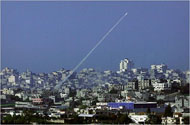
The United States dotted the I’s and crossed the T’s on August 26 when its Consul General in Jerusalem Daniel Rubinstein told PLO executive committee member Saeb Erekat that the US would stop its financial aid to the Palestinian Authority if the Palestinians go to the UN for statehood in September.
Rubinstein also told Erekat that the US would veto any Palestinian vote. “If the Palestinian Authority insists on going to the Security Council, the U.S. will use the veto," Rubenstein told Erekat during a meeting in Jericho.
"And in case the Palestinian Authority seeks to upgrade its position at the UN through the General Assembly, the U.S. Congress will take punitive measures against it, including a cut in U.S. aid," he said.
Speculation over the veto and the aid cut has been floating around for months. However, Rubenstein’s statements constitute the first official confirmation of the US stance against what it deems to be a “unilateral step” by the Palestinians.
This has not stopped the Palestinian leadership from continuing with its plans, nor has it deterred certain countries from recognizing Palestine. On August 26, Honduras announced it recognized the state of Palestine, according to Wafa, the official Palestinian news agency.
A day earlier, El Salvador also recognized Palestine as an independent state. According to its President Mauricio Funes, his country’s decision came “in the context of the profound respect El Salvador has for sovereign decisions by members of the United Nations, the majority of whom have recognized the Palestinian state," he said during a news conference.
Spain has also made some very positive statements concerning Palestine’s bid for statehood. Last week, its foreign minister Trinidad Jiménez said her country would push EU members towards recognizing a Palestinian state come September. She said the EU now has the “level of maturity” needed to recognize two states.
“Appealing to the United Nations cannot be a hostile act against anyone,” she said in an interview with El Pais. “It is the organization that most widely and legitimately represents all of us. I truly believe that when the Palestinian National Authority started going down this path, it felt it was the best way to ensure peace.”
Of course, Israel does not think so, fuming over Jiménez’s statements and sending Israeli envoys to Spain to explain the Israeli position.
Statehood or not, little has changed for the Palestinians on the ground. This week, Israel continued to bomb Gaza, killing 11 people in 24 hours on August 24-25.
On August 25, an Israeli airstrike killed two members of the Islamic Jihad's armed wing in the Strip, Salim Al Arabid and Alaa Hamdan.
A day earlier, three people were killed in Gaza Strip, including Al Quds Brigades commander Ismail Al Asmar. Over the course of the week, two ceasefires have been called with Egyptian mediation between armed factions in Gaza and Israel, with both falling through within days.
Since the renewal of hostilities following the August 18 border attack between Egypt and Israel, some 24 Palestinians and an Israeli have been killed. Although there have been no confirmed reports on the identities of the perpetrators, Israel immediately held Hamas responsible for the attack.
On August 26, the Hamas de facto government in Gaza called for calm. Government spokesperson Taher Nunu said his government has called on the factions “not to give an opportunity to the (Israeli) occupation government to escalate its aggression further.”
According to the Gaza-based Palestinian Center for Human Rights, the rockets intended for Israeli territory have also fallen on friendly ground. The center said on August 24 that eight Gazans, including two children and three women were injured by the Palestinian-shot rockets fired into populated areas. PCHR has called on concerned authorities to “investigate the incidents, take the necessary measures to ensure the non-recurrence of such incidents and to provide protection to civilians."
Israel expanded its operations into the West Bank as well, rounding up around 120 people on August 21, mainly from Hebron and Bethlehem. According to Palestinian sources, most of those arrested were Hamas activists, including member of parliament Mutlaq Abu Juheisha.
In the West Bank, Palestinians are battling the ever-present threat of settlement construction. On August 25, the Silwan-based Wadi Hilwa Information Center said a new settlement outpost comprised of eight housing units and four floors would be built in the Ras Al-Amud neighborhood in Silwan. On August 24, Peace now reported that 17 new housing units had already been completed in the Ras Al Amoud neighborhood of Jerusalem.
Furthermore, on August 20, Israeli officials ratified a plan to build 250 new settlement units and a major shopping center on West Bank lands confiscated from the Jerusalem-area villages of Bet Hanina and Bet Iksa.
West Bank settlers also set fire on August 25 to 100 olive trees in Mikhmas, a Ramallah-area village.
Finally, President Mahmoud Abbas issued a presidential decree on August 22 postponing local council elections, scheduled for October 22. According to the president, the elections were pushed back “until conditions were appropriate in all districts of the homeland.” Hamas, which maintains control of the Gaza Strip, previously said it would not participate in local elections until the reconciliation agreement between Hamas and Fateh is put into action, something which has yet to happen.







